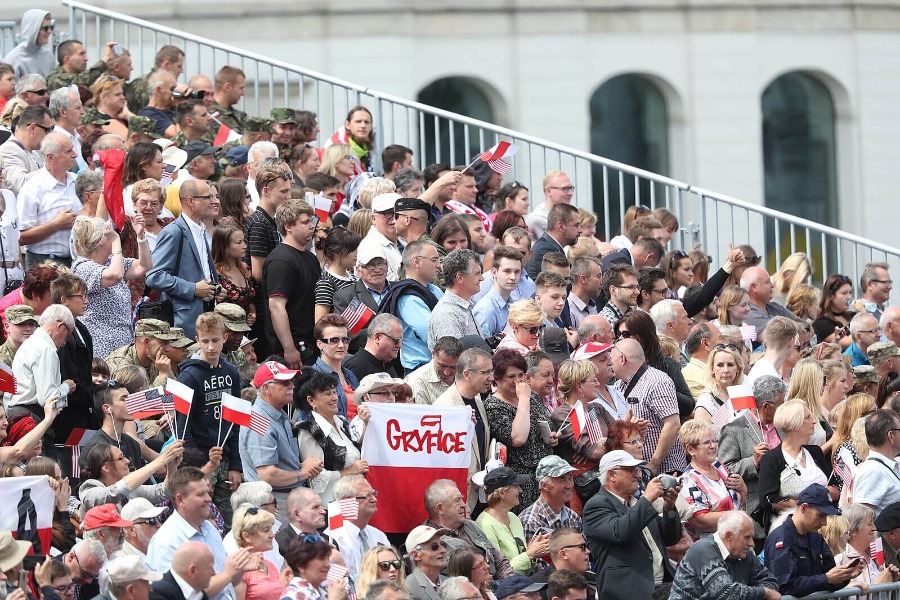Today's Headlines and Commentary
In a press conference with the President of Romania this afternoon, President Donald Trump stated that former FBI Director James Comey had lied under oath when testifying before the Senate Intelligence Committee the previous day, said he was willing to speak to that effect under oath, and refused to say whether tapes of his conversations with Comey exist, as he has previously suggested.
Published by The Lawfare Institute
in Cooperation With

In a press conference with the President of Romania this afternoon, President Donald Trump stated that former FBI Director James Comey had lied under oath when testifying before the Senate Intelligence Committee the previous day, said he was willing to speak to that effect under oath, and refused to say whether tapes of his conversations with Comey exist, as he has previously suggested. This morning, the President tweeted, “Despite so many false statements and lies, total and complete vindication … and WOW, Comey is a leaker!” “James Comey confirmed a lot of what I said, and some of the things that he said just weren’t true,” Trump stated. The New York Times reports.
Speaking at the press conference, Trump reaffirmed Article V of NATO, committing the United States to the alliance’s promise of collective self-defense. His failure to underline that commitment in his address before NATO leaders during his overseas trip, as he was expected to do, raised serious concerns among member nations of the alliance and within the United States.
Trump also harshly criticized Qatar, the host of a major U.S. military base in the Persian Gulf and the subject of a diplomatic crisis in the region following a blockade by a group of Gulf Arab nations, as “historically … a funder of terrorism at a very high level.” His statements were in sharp contrast with comments made by Secretary of State Rex Tillerson earlier this morning, urging Gulf states to ease the blockade, which he said puts at risk U.S. military efforts against the Islamic State.
The Times further reports on yesterday’s testimony of former FBI Director James Comey before the Senate Intelligence Committee. In recounting personal interactions with Donald Trump that he had carefully documented, Comey told lawmakers he believed Trump had tried to bring an end to the FBI investigation into former National Security Advisor Michael Flynn. Comey refused to explicitly say that the President had attempted to obstruct justice, but Peter Baker at the Times writes that the apparent “cloud” of the Russia investigation that Trump had hoped to clear has only grown with the possibility of an investigation into the President for obstruction. Comey accused the President of lying about their interactions and defaming the FBI, and he also testified that he had given details from one of his memos to a friend to pass along to the media in hopes of encouraging the appointment of a special counsel, which it did.
Politico reports that on Capitol Hill, Republican lawmakers who publicly hesitated to attack Trump or provided explanations for his behavior had privately admitted that Comey gave a convincing performance and expressed their fear that surprises in the Trump investigation would continue.
Former Assistant Attorney General for National Security John P. Carlin writes in the Post about whether a sitting president can be prosecuted and how this question could affect the investigation moving forward. Carlin argues that Special Counsel Robert Mueller will have to confront many of the difficult legal and investigative decisions that could arise if the investigation reaches the President.
Testifying before the committee, Comey disputed the accuracy of a New York Times article on contacts between Trump campaign aides and Russian intelligence officials. The Times examines its previous reporting in context of Comey’s statement here.
In U.K. politics, the snap election called by Prime Minister Theresa May to gain support prior to Brexit negotiations backfired, reports the Journal. May’s Conservative Party lost seats, eliminating its majority in Parliament. The Guardian confirms that May will form a minority government with the conservative Democratic Unionist Party in Northern Ireland, which had its best general election results ever with ten seats. May is attempting to project stability to minimize the damage that new uncertainties could have on the Brexit negotiations set to begin in only ten days, according to the Post. The Journal has live updates as the political situation develops.
The United States shot down an armed drone operated by pro-Syrian government forces that had fired at forces belonging to the U.S. coalition yesterday, Reuters writes. The incident is the latest in a string of unusually direct confrontations between the United States and forces allied with the Syrian government.
The Times examines the increase in cyber “espionage-for-hire” as a tactic that even less sophisticated governments can use to harm rivals, with the recent diplomatic crisis between the Gulf states and Qatar as a primary example. The chaos was initially sparked by inflammatory media reports which the Qatari government has claimed were misinformation planted by foreign hackers. Meanwhile, Saudi Arabia, the United Arab Emirates, Bahrain, and Egypt added dozens of individuals allegedly linked to Qatar to a terrorism blacklist, deepening the rift.
CNN reports that the U.S. Attorney’s Office for the Southern District of New York announced Thursday that two naturalized U.S. citizens have been charged with crimes relating to supporting Hezbollah. The press release details the allegations against Ali Kourani of New York and Samer El Debek of Michigan, including providing material support for Hezbollah, conspiring to receive military-type training, and weapons offenses that involved machine guns and rocket-propelled grenade launchers. The two allegedly conducted separate intelligence operations, including the evaluation of targets in the U.S. and the vulnerabilities of the U.S. and Israeli Embassies in Panama.
ICYMI: Yesterday, on Lawfare
Benjamin Wittes posted Rational Security: The “Door by the Grandfather Clock” Edition.
Chris Mirasola provided background on Christopher Wray, Trump’s new pick to head the FBI.
Robert Litt commented on DNI Coats’ and NSA Director Rogers’ struggles to explain why they would not answer when senators questioned them if Trump had asked them to prevent the Russian probe—and what a better answer might have been.
Ben, Quinta Jurecic, and Jane Chong liveblogged Comey’s testimony before the Senate Intelligence Committee.
Shannon Togawa Mercer kept track of key responses to the Comey testimony.
Shannon also posted about how exit polls in the U.K. election seemed to predict a hung Parliament.
Ben gave his initial comments on the Comey testimony.
Jane, Susan Hennessey, and Quinta looked at what new information we gained from the Comey testimony.
Matthew Kahn posted a special edition of the Lawfare Podcast that trimmed the Comey testimony down to just the facts.
Email the Roundup Team noteworthy law and security-related articles to include, and follow us on Twitter and Facebook for additional commentary on these issues. Sign up to receive Lawfare in your inbox. Visit our Events Calendar to learn about upcoming national security events, and check out relevant job openings on our Job Board.





